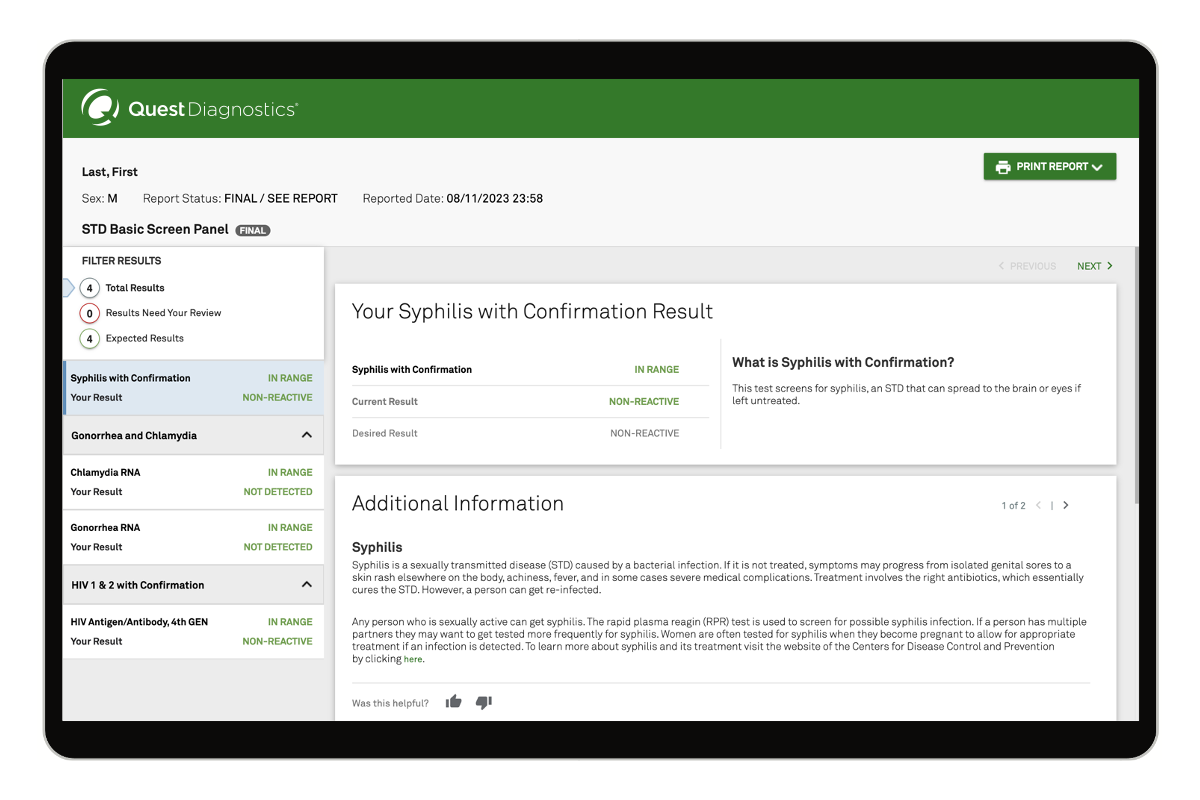STD Screening Test Panel — Basic
This STD panel test screens for four of the most common sexually transmitted infections and diseases: chlamydia, gonorrhea, syphilis, and HIV 1 & 2. If your STI panel test results are abnormal, an independent physician may be able to provide treatment options at no extra cost. Read moreSexually transmitted diseases (STDs) are common infections that spread from person to person during sexual activity and skin-to-skin contact. This STD panel screens for four of the most common sexually transmitted infections: chlamydia, gonorrhea, syphilis, and HIV 1 & 2. Individuals with STDs may not experience any signs or symptoms, and this can lead to serious health complications. If you’re sexually active and have unprotected sex, STD screening panels offer a convenient pathway to early detection and effective treatment.
Buy your own STD panel test online with Quest. No doctor’s visit is required – simply purchase STI panel testing, visit a nearby Quest® location for sample collection, and get fast results. If your test results are abnormal, an independent physician may be able to provide treatment options at no extra cost.
Compare Tests
And find the right tests for you.
| Test For |
STD Screening Test Panel — Basic |
STD Screening Test Panel — Expanded |
|---|---|---|
| Chlamydia | ||
| Gonorrhea | ||
| Syphilis | ||
| HIV 1 | ||
| HIV 2 | ||
| Hepatitis B | ||
| Hepatitis C | ||
| Trichomonas | ||
|
$149.00
|
$282.00
Learn More
|
STD Screening Test Panel — Basic |
STD Screening Test Panel — Expanded |
|---|---|
| Chlamydia | |
| Gonorrhea | |
| Syphilis | |
| HIV 1 | |
| HIV 2 | |
| Hepatitis B | |
| Hepatitis C | |
| Trichomonas | |
|
$149.00
|
$282.00
Learn More
|
How it works
questhealth.com offers 100+ consumer-initiated Quest Diagnostics lab tests to empower you to have more control over your health journey. Choose from a variety of test types that best suit your needs.
It is not always possible to know if you have an STD because many people do not have symptoms. Testing is the only way to know for sure if you have a sexually transmitted infection. Some of the most common symptoms include:
- Burning with urination
- Increased urinary frequency
- Itching or irritation of the vagina or penis
- Discharge from the vagina or penis
- Lower abdominal pain
- Pain during sexual intercourse
- Unusual vaginal bleeding
- Pain in the scrotum or penis
Anyone who is sexually active should get tested at least once a year. If you have new or multiple partners, consider getting tested more frequently. The Centers for Disease Control and Prevention (CDC) makes the following STD annual screening recommendations, even in the absence of symptoms:
Chlamydia and Gonorrhea
- Sexually active teenage girls and women (< 25 years old)
- Sexually active women (≥ 25 years old) who have sex with more than 1 partner and do not use condoms
- Sexually active gay, bisexual, and other men who have sex with men (MSM)
- Men and women who are infected with HIV
Syphilis
- Pregnant women
- Sexually active gay, bisexual, and other men who have sex with men (MSM)
- Men and women who are infected with HIV
HIV-1 and HIV-2
- Sexually active men and women (including teenagers)
- Pregnant women
- Men who have sex with men (MSM)
According to the CDC, by following step-by-step collection instructions, patients can collect their own samples correctly, and the results of the tests are as accurate as when they are collected by a doctor.8
The Quest Patient Service Representative (PSR) will provide you with a vaginal collection kit that comes in a sealed, protective wrapper and includes a step-by-step collection instruction sheet.
Read all instructions before starting to collect a sample. Failure to follow the instructions could affect the test results. If you have questions prior to performing your self-collection, you may ask the PSR or call 1.833.700.2423. The concierge line is open Monday-Friday 8:00 AM to 7:00 PM EST. It is closed on weekends and holidays.
If you accidentally drop the swab or collection tube (or contaminate them in any way), inform the PSR, who will dispose of them and provide new ones. If you are unable to self-collect, please contact your doctor. The collection cannot be done by the PSR.
References
1. CDC estimates 1 in 5 people in the U.S. have a sexually transmitted infection. Centers for Disease Control and Prevention.
https://www.cdc.gov/media/releases/2021/p0125-sexualy-transmitted-infection.html
2. Gonorrhea CDC Fact Sheet. Centers for Disease Control and Prevention.
https://www.cdc.gov/std/gonorrhea/stdfact-gonorrhea.htm
3. Chlamydia CDC Fact Sheet. Centers for Disease Control and Prevention.
https://www.cdc.gov/std/chlamydia/stdfact-chlamydia.htm
4. Which STD Tests Should I Get? Centers for Disease Control and Prevention.
https://www.cdc.gov/std/prevention/screeningreccs.htm
5. Syphilis CDC Fact Sheet. Centers for Disease Control and Prevention.
https://www.cdc.gov/std/syphilis/stdfact-syphilis-detailed.htm
6. About HIV. Centers for Disease Control and Prevention.
https://www.cdc.gov/hiv/basics/whatishiv.html
7. STI Treatment Guidelines. Centers for Disease Control and Prevention.
https://www.cdc.gov/std/default.htm
8. CDC. Recommendations for the laboratory-based detection of Chlamydia trachomatis and Neisseria gonorrhoeae. MMWR Recomm Rep. 2014;63(2):1-19. Accessed July 17, 2024. Recommendations for the Laboratory-Based Detection of Chlamydia trachomatis and Neisseria gonorrhoeae — 2014 (cdc.gov)
Sources
- World Health Organization (WHO). Sexually transmitted infections (STIs). Accessed August 4, 2023. https://www.who.int/news-room/fact-sheets/detail/sexually-transmitted-infections-(stis).





